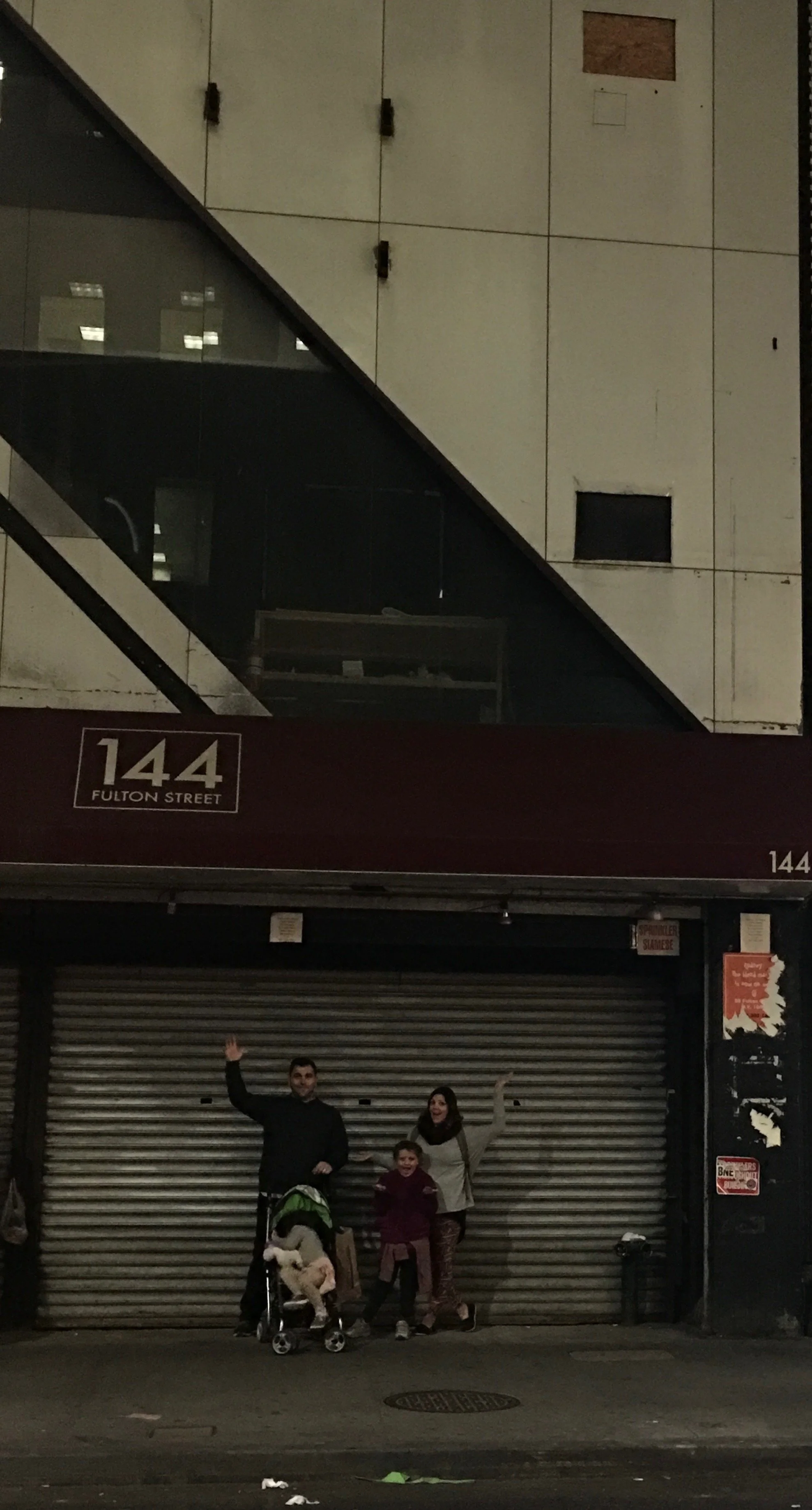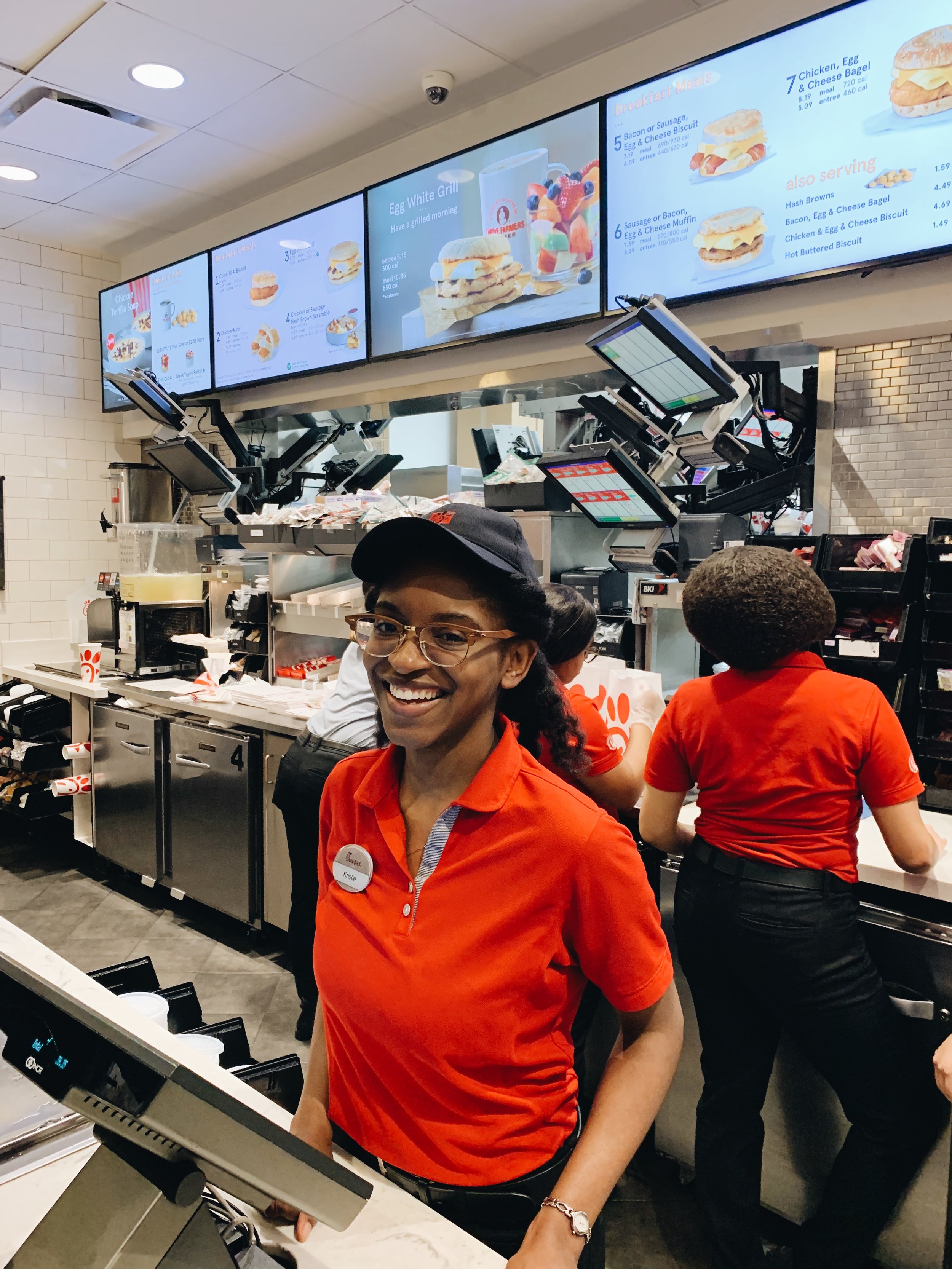THE STORY OF THE 144
A twelve foot inflatable rat awaited us on the stained sidewalk, hovering like a promise that NYC never allows progress without resistance.
We exited the building after midnight, thirteen Big Apple novices tasked with the Grand Opening of the most unique flagship Chick-fil-A had ever dared: a five floor restaurant with roof-top seating in the heart of lower Manhattan, boasting a soaring central staircase (and four others), two elevators, and over a half-million potential guests flowing past our glass doors every month…
Mike Tyson once said, "Everybody has a plan until they get punched in the mouth."
Due to construction delays, the bakers dozen of leaders were granted five extra months to plan the launch of 144 Fulton St, and we’d filled white boards and google docs with detailed job descriptions and core values, anticipating a seamless flow of nuggets and smiles to win the hearts of New Yorkers.
It was the night before we opened. Our shirts were wet with the sweat of labor, mopped floors and straightened chairs, polished metal and sparkling restrooms. We’d circled up in the lobby, arms on shoulders, game plans reviewed, prayers of blessing offered, and an early spring chill met our exhausted but excited faces.
The rat, representing a labor protest, threw the opening punch into our collective cheeks, a symbol of the cost required to do business in the financial district.
Iron Mike understood what we did not.
You need more than plans to beat the champ, you need resilience.
“When we opened, we had a line out the door and down the block of guests wanting to order with us. The demand actually crashed our mobile CFA app and created unforeseen problems, forcing us to shut it down. While this was happening, we continued to have building issues. Our elevator would go down weekly, we had drains backing up because of cement from construction, and we overloaded the power box for the restaurant causing all power to completely shut off multiple times. We realized early on that Fulton St. would be a furnace that forged people.”
Luke Cook, the Operator chosen for the adventure of running the five floor monster of a building, named the truth of our restaurant.
We would be more than food service representing a brand, we would be a kiln of refining, where trust could only be earned after learning the unforgiving streets of respect, where idealism met chaos, and where southern hospitality popped from the gritty magic of the urban north.
Beyond the punches of the rodent king and overwhelmed mobile apps, we faced daily body blows from the unique design of our building…a lobby under fifteen feet wide with a single five foot door for both entering and exiting a ten million dollar business, a counter space less than twelve square feet to handle the 65% of our sales relentlessly pouring in from digital portals, as well as five floors to maintain, five separate restrooms to clean, and five stairwells of fire codes to keep.
At our peak, an open rooftop more attractive to bands of teenagers than the local mall that requires diligent monitoring lest milkshakes are chucked down onto the guests below. And on our lowest level a metal-walled cellar, to prevent the real rats from chewing through concrete, where the majority of our storage resides, meaning every forty pound box of chicken, every cube of waffle fries must be stacked and sent up the service elevator, unless it’s broken, like it remained for eleven of our first eighteen months.
This is the story of the first five years of 144 Fulton St.
A journey of impossible numbers and how to grind without losing your mind, a crash course in banding together to climb the mountain rather than complaining alone about its height.
The whirlwind of running the restaurant never slowed from the opening day, because NYC hustles at its own pace and allows no entrepreneur to catch their breath, there is no pit for the race car to pull into, adjustments are made on the track at full speed.
New numbers were encountered, from the hidden labor costs of keeping the massive building cleaned and in order, to the monthly cost of the HVAC units required to heat and cool the space, from the amount of garbage bags collected in a refuse room waiting to be hand delivered to the streets at night, to the required diligence of maintaining the legal intricacies of the NYC labor laws.
Luke discovered the energy of New York, which attracted him to his acceptance of the role, was the same energy that would drain him if he didn’t examine his priorities.
“I realized that this restaurant, in this City, will take all you have to give and then some. I learned early that if i was going to make it here I needed to take better care of my mental and physical health. I needed to slow down, be in less decisions, trust my people, have fun, and find the joy in what I do again.”
Instead of revving up his planning, and throwing more of himself into the schedule, he doubled down on who he is and what he values, traits like generosity and creating memories for those he loves…and most importantly, facing challenges head on with honesty and care:
Birthday parties for Team Members.
Weekly coffee and breakfast with leaders with no agenda other than not talking about business.
Not only Sundays off, but one more work free day for his directors.
And weekly meetings, where he forced his team to “rumble" with the uncomfortable moments of the shift, or to collectively gather the courage to make the tough but right call.
Unfortunately, as the boss adapted in the furnace of Fulton St., leaders and Team Members able to both navigate and endure the speed and demands of the daily heat proved difficult to retain, but he continued to invest in people, seeking for those who could not only see his vision, but find fun in facing the struggles he named opportunities.
Month by month, the wild stories piled up, trespassers causing brawls in the kitchen or gang rallies in the dining room, bomb threats in the subway next door, or sudden departures for valid reasons by leaders whose resilience matched the challenge of the store, but for those who stayed, they began to taste victories as well…
Sophia Crawford, one of the two original remaining Team Members from the Grand Opening still on staff, stuck it out through the mayhem, moving from making biscuits to anchoring the role of leading prep work in the cellar, as well as providing the young leaders a wise and empathetic ear.
“I am so grateful and honored by being apart of this work family. I have learned and grown so much…I became a mother to many, and it’s a fulfilling position.”
Others locked arms and fought through the crowded lobby, both literally and figuratively, to solve problems mid-shift in stairwells, carry every stroller up two flights of stairs when the elevator was down, or cater a thousand boxed lunches to a dance team during Macy’s Parade week when you only have seating for a 150.
The chaos never diminished…
Luke’s cadre of dedicated folks just built a better saddle to ride it.
Sales numbers increased. Labor numbers decreased. Retention rallied. Systems solidified.
And as the core of folks that walked the early valleys of Fulton St. allowed the fires to harden the best parts of them and purge the parts of them unnecessary to make their unique business hum, they turned the corner, their race car finally catapulting into the lead with real profits in January and February of 2020, almost two full years since opening…
A full month hovered next on the horizon, brimming with hope and momentum…
March of 2020.
Luke remembers it well.
“The business was operating at a very high level. All the hard work we put into it since 2018 was starting to pay off and we were in a great groove…and the world stopped.”
But once again, he checked his values, consulted with his trusted team, and made the courageous decision required for the biggest challenge Fulton St. had conjured yet, how do you run a five floor restaurant during a pandemic in a downtown that’s been shutdown?
“No one really knew how to navigate it appropriately. When it began spreading we decided to close the restaurant for almost two months. We worried about our Team Members, their families, and the health of our world. Business was just secondary in that moment.”
It was a moment worthy of Sisyphus, for as the Team hit the impossible numbers they’d sought and built a collective mind able to withstand the grind, the whole business not only rolled down the mountain but crashed into an unknown valley.
But that’s the thing about a fighter forged in a furnace, once they’ve been hammered and quenched into shape, it doesn’t matter how many times they get knocked down, as long as there’s a will to keep going, the fighter will rise up.
COVID seemed like a knockout punch, but Luke and the team came back swinging with two years of Fulton lessons in their fists.
“Weeks went by and we decided to try to reopen the business. We redesigned the restaurant to respect social distance, and health screened Team Members before and during every shift. We scaled back our menu to ensure we could operate in a way to ensure safety. Sales were decimated, but it didn't really matter. It was about being present for each other. It was about humanity. That season forged a bond with our Team that will last a lifetime. We carried each other through it all and I'm proud of the way we cared for one another.”
The hustle and grind started again as the skeleton crew commuted on empty subway cars and served guests in their Fi-Di ghost town behind masks and plexiglass. Leaders shouldered new loads and untangled foreign knots. New Team Members entered the furnace only after being warned the job would knock them down over and over yet deciding the “juice would be worth the squeeze.”
The fog of the dark valley lifted, the familiar mountain appearing into view.
Instead of thirteen specialized leaders, Luke built a nimble team capable of flexing with the pace of their restaurant, centering them in his main “business” which is “valuing the person over the actual work, to treat people like human-beings, not human-doings.”
Round after round, they stayed in the ring of 144 Fulton St., answering the bell day after day…
Better systems emerged from creative synergy.
Retention blossomed in a culture of belonging.
Labor numbers decreased to levels unthinkable in 2019.
Sales numbers increased to their highest heights.
“It was a long road back, but we never gave up. We kept getting better. We bet on people when we didn't have the sales to do so. Our Leadership Team has created a space that respects and values Team Members. They continue to innovate in the business in order for us to serve the customer faster and with genuine hospitality. The resilience and commitment that they have shown over the past few years is reaping a harvest none of us could have foreseen.”
And on our five year anniversary no one wants to revisit the lessons of Sisyphus, but we’re also well aware of the warnings of Icarus. The downtown building we call home has no place for a lack of humility, and as any New Yorker will tell you, you never disrespect the city by acting like you beat it.
Luke knows how fast it all can change and knows there are others out there with big dreams and the obstacles that go with them.
“I’ll always be honest about how hard it is. Just don't give up. Surround yourself with people who push you. The challenges bring the opportunity to broaden your base as a leader…don't run from them. Walk up to the mountain, look at it, and go directly over it. Welcome all the emotions to the table that you are feeling and take good care of yourself.”
Wouldn’t hurt to take a few punches in the mouth, too.
Luke and his family at 144 Fulton St before it was transformed into the world’s tallest Chick-fil-A
The line stretched down the block on opening day:
















